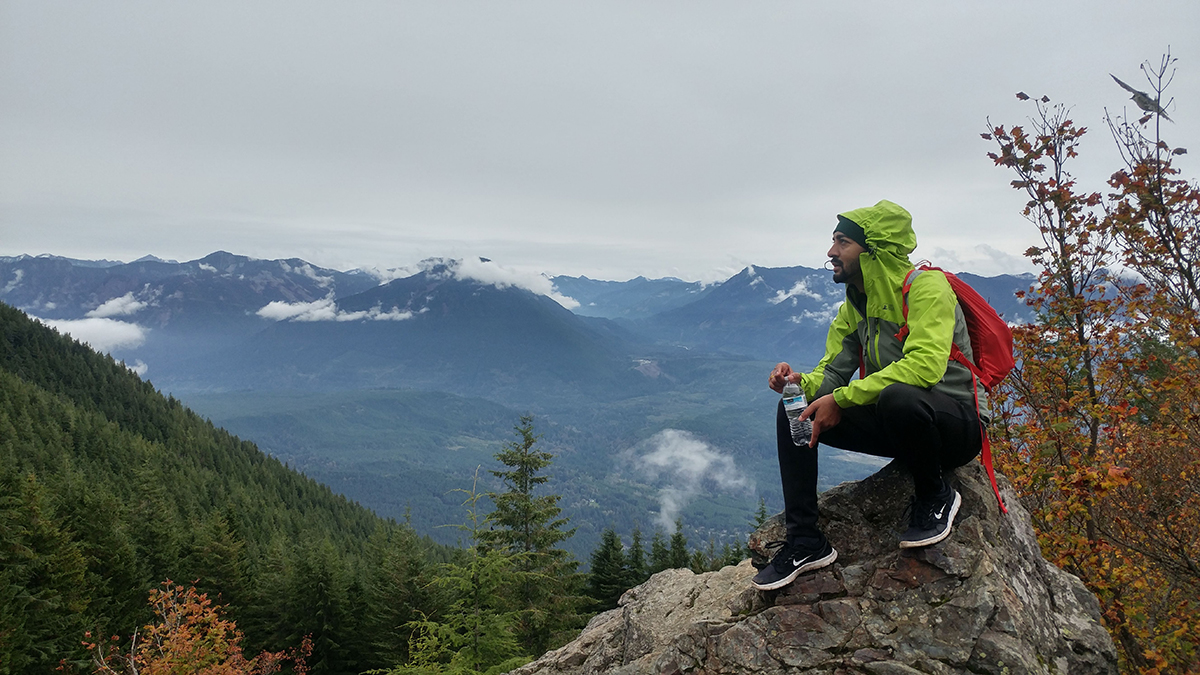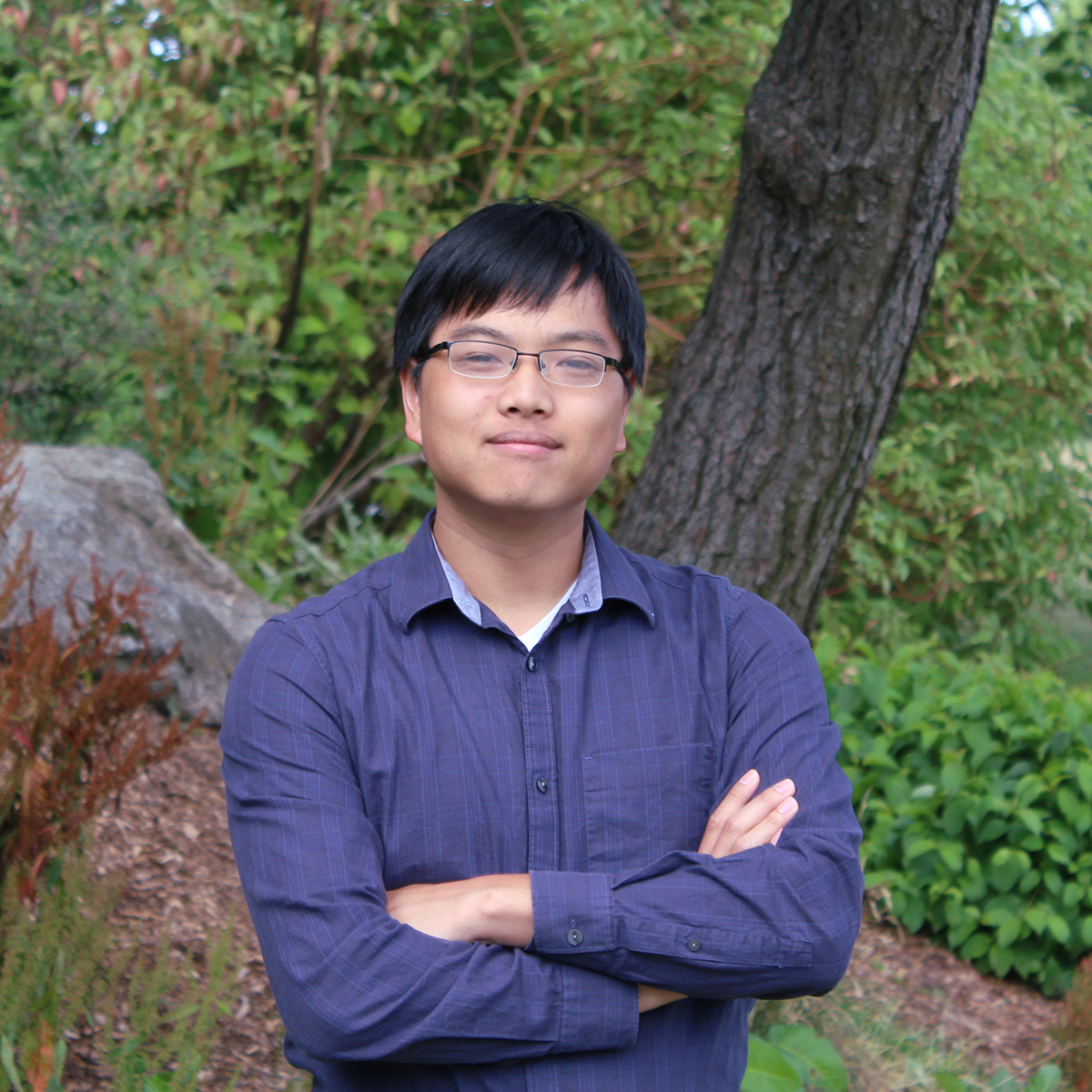
ECOSS’ Multicultural Outreach Manager Allan Kafley led over a dozen Bhutanese community members on their first-ever hike up Mt. Si.
Photo Credit: Allan Kafley / ECOSS.
Immigrants and refugees make up almost 20 percent of Seattle’s population. Yet, these communities are some of the most underserved by environmental initiatives. When immigrants and refugees first arrive in Seattle, they are unfamiliar with their new surroundings. Is the tap water safe to drink? Where does the garbage go after collection? What fish are safe to eat from nearby rivers and lakes? How does one access outdoor recreation? Where does one go for information? All straightforward questions for long-time Seattle residents. But language, cultural, and lifestyle differences prevent immigrants and refugees from accessing the same public services, education, and opportunities.
ECOSS’ New Arrivals program changes this dynamic. A nonprofit that specializes in multicultural outreach, ECOSS empowers diverse communities and businesses to implement environmentally sustainable practices. The New Arrivals program epitomizes this mission for immigrant and refugee communities. By centering outreach on the concerns and cultures of immigrants and refugees, community members become the creators of their own environmental resiliency.
Assessment is the first of three pillars in this outreach. We collaborate with Bhutanese, Burmese, Ethiopian, Latinx, Cambodian, and Vietnamese communities to understand their concerns, hear their needs, and learn about their interests. Emergency preparedness, fishing regulations, water quality, outdoor recreation, and more are common topics of interests among these communities.
From these discussions, we help inform and educate communities about topics of interest -- the second pillar of New Arrivals outreach. For example, ECOSS partners with the Washington Department of Fish and Wildlife to convey knowledge of fishing sites and regulations to community members. Cambodian, Vietnamese, and other staff visit homes to talk to families about how to use household cleaners safely. And we collaborated with schools to create skits around healthy seafood. All of these educational activities are done in the communities’ languages to cater to them and their ideas.
Finally, experiences are essential for feeling connected to one’s environment. The third pillar of New Arrivals outreach focuses on engaging communities in hiking, camping, and other outdoor activities. Some immigrants and refugees might have been connected to nature in their native countries but are unfamiliar with the Pacific Northwest landscape and outdoor opportunities. Others have no experience with the outdoors at all, especially youth who grew up in refugee camps before arriving in the United States. The New Arrivals program brought more than 40 Bhutanese community members to Deception Pass, a popular Washington state camping destination; many were first time campers. Partnerships with King County and The Wilderness Society promoted outreach of public transit options that increased outdoor recreation access, which were widely popular with Bhutanese, Cambodian, Korean, and Latino communities. And ECOSS has led multiple trips to the Cedar River Watershed to introduce diverse communities to the source of their drinking water and demonstrate why it is safe to drink. Through assessment, education, and experiences, communities become connected with nature and with each other in a hitherto-unfamiliar environment.
Community engagement built on trust and inclusivity is a key component to outreach success. ECOSS was founded 25 years ago to bring public agency services and education to underserved communities in South Seattle. At the time, people of color represented 60-70 percent of South Seattle residents. In addition to being geographically separated from the center of Seattle, immigrants and refugees were isolated by language barriers. Immigrants’ and refugees’ concerns weren’t being heard. ECOSS recognized these inequalities and adopted an environmental justice lens by hiring directly from these communities. Native speakers of Spanish, Vietnamese, Amharic, and many other languages delivered education on stormwater and Duwamish River pollution with a focus on their communities’ needs. Similar outreach models persist to this day. Since then, ECOSS has employed nearly two dozen languages for outreach.
Environmental justice is not simply a goal for ECOSS; it is our identity. The New Arrivals program relies on key community members to lead groups and be the liaisons between ECOSS and the rest of their communities. Immigrant and refugee communities are able to trust and connect with ECOSS when they see staff that look like them, talk like them and come from where they come from.
Hiring from the community develops leadership capacity within the community. Case in point, ECOSS sent community group leaders to a Washington Trails Association workshop to learn how to lead fun and safe outdoor experiences for their communities. Participants then felt empowered and knowledgeable enough to plan and lead their own summer camping trip to Snoqualmie River. Ultimately, we are not the final resource for environmentally resilient communities, but rather the spark.
Because of community leadership development, New Arrivals program goals can be shaped by communities for communities. The communities’ success is the program’s success. We track quantitative metrics such as the number of field trip participants or the proportion of first-time hikers. But true impact can be felt in community members’ qualitative feedback:
“This fresh running water reminds [me of] my childhood time. When I was nine or10 years old, I used to go swim with my friend in this kind of fresh river in Bhutan.” Bhutanese community member on a camping trip in Snoqualmie Valley.
“I always love to play in snow, and today is my best day because I just experienced another new way to enjoy the snow.” Bhutanese community member snowshoeing for the first time in Mt. Baker-Snoqualmie National Forest.
“Trailhead Direct is very convenient for people like me that do not like to drive far. I’m already planning more hikes with friends.” Cambodian community member and first-time hiker using newly-expanded public transit to nearby trailheads.
“Right here, near the big city is this beautiful recreational spot, but I never knew it before.” Bhutanese community leader snowshoeing for the first time in Mt. Baker-Snoqualmie National Forest.
And when communities, agencies, and foundations continue to collaborate and support the New Arrivals program year after year, success is easily apparent in the growth of the program’s scope and leaders.
Robust private and public collaborations make the New Arrivals program possible. Foundations committed to environmental justice and equity are instrumental to the financial sustainability of the program while also providing leadership development opportunities to ECOSS staff and community members alike. These private organizations include the Satterberg Foundation, Rose Foundation, and Cuyamaca Foundation. Partnerships with King County Department of Natural Resources, U.S. Forest Service, and other public agencies provide access to environmental education and services that communities would likely never know about otherwise.
Every community deserves to be environmentally sustainable and resilient, but immigrants and refugees are underrepresented in discussions around environmental solutions. In Seattle, ECOSS is breaking down these barriers by being an effective partner to agencies and a trusted resource within communities. We create bridges over environmental injustices. And this model can and should be applied everywhere to promote environmental and racial equity. We employ a community-based social marketing framework that engages communities from the initial planning stages in researching habits, barriers, cultural beliefs, incentives, and more. The key is to take the time to listen and understand communities’ culture. Knowing, understanding, and having trusted relationships in the community is crucial to developing effective outreach strategies to immigrant and refugee communities. Only together can we achieve sustainable solutions for all.
Works Cited
1 City of Seattle, Office of Immigrant and Refugee Affairs. 2016. Seattle Immigrant and Refugee Data Sheet. www.seattle.gov/iandraffairs/data.
2 City of Seattle, Office of Planning and Community Development. 1993. 1990 Decennial Census Sub-area Profile: Duwamish. www.seattle.gov.
Author bio

William Chen is ECOSS’ communications manager, responsible for digital marketing and storytelling to promote the organization’s work on environmental equity and sustainability. Prior to his current role, he worked on the marketing team for The Nature Conservancy’s Washington state chapter. William graduated from University of Washington with a M.S. in Quantitative Ecology and leverages his background for an evidence-based approach to communications.
To learn more about ECOSS, please visit https://ecoss.org/.


